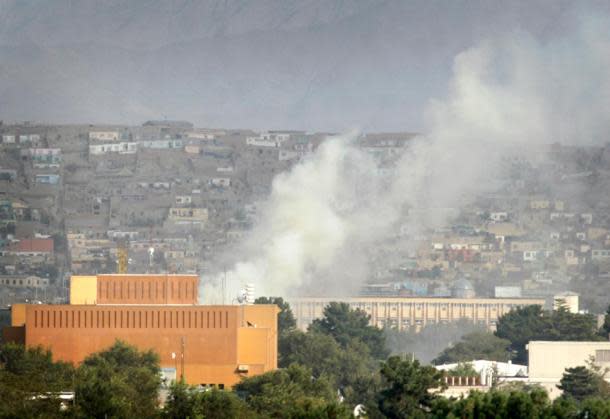 The Envoy
The EnvoyOne American killed in attack on CIA Kabul station by Afghan employee

An Afghan employee launched a gunfire attack on the CIA station housed in the U.S. embassy complex in the Afghan capital Kabul Sunday, killing one American citizen and wounding another.
The "lone attacker," an Afghan employed by the U.S. government, was also killed, an embassy spokesman said.
"There was a shooting incident at an annex of the U.S. embassy in Kabul last night involving an Afghan employee who was killed," a spokesman for the U.S. embassy in Kabul, Gavin Sundwall, told journalists Monday, Reuters reported. "The motivation for the attack is still under investigation at this time."
It wasn't immediately clear if the two Americans killed and wounded in the attack were "victims of a rogue employee who had been won over to the insurgent cause, or just the escalation of an argument in a city were tensions are high and many people carry guns," the Reuters report said.
The attack on the heavily-guarded CIA Kabul facility Sunday followed an earlier insurgent attack this month on the U.S. embassy. The CIA station in Kabul is reportedly the agency's largest overseas facility.
Adm. Mike Mullen, chairman of the Joint Chiefs of Staff, last week charged that Pakistan's Inter-Service Intelligence directorate, the ISI, has been using members of the Taliban-linked Haqqani network to wage recent attacks against U.S. personnel and facilities in Afghanistan. American officials said that Haqqani insurgents carried out the September 13th attack on the American compound, as well as another attack this month on the NATO headquarters that wounded 77 people. U.S. officials also say the group is responsible for a June suicide attack on Kabul's Intercontinental hotel.
"The Haqqani Network . . . acts as a veritable arm of Pakistan's Inter-Services Intelligence agency," Mullen told the Senate Armed Services Committee last week.
Mullen's blunt appraisal of the ISI's ties to the Haqqani group is especially striking since he has spent years cultivating a rapport with Pakistan's powerful military chief, Gen. Ashfaq Kayani.
But Mullen also stressed the importance of cultivating figures such as Kayani--who oversees Pakistani intelligence operations--as U.S. allies. "Indeed, I think we would be in a far tougher situation today, in the wake of the frostiness which fell over us after the bin Laden raid, were it not for the groundwork General Kayani and I had laid —were it not for the fact that we could at least have a conversation about the way ahead, however difficult that conversation might be," Mullen said.
Pakistan has angrily denied the charges that it supports the Haqqani network, but has rejected repeated American calls to go after the group. However, reports on this month's attack on the U.S. embassy indicate that the attackers' cell phone records had shown calls to known Pakistan ISI agents in advance of the action.
A former U.S. intelligence official who has worked in the region told The Envoy that Pakistani officials would not go after the Haqqani network.
"The [Haqqani] family controls the area around Khost--they always have, and they always will. And they are all very skillful guerrilla fighters," the former official told The Envoy Sunday. "They also have tremendous support--financial and moral--from rich Arabs in the Gulf where Jalaluddin [Haqqani] has arranged diplomatic marriages and business alliances for himself and the other members of his family."
In a defiant sign that it was exploring making good on its threat to break off its troubled alliance with the United States, Pakistani ISI chief Gen. Ahmad Shuja Pasha met Monday with his Saudi Arabian and Chinese intelligence counterparts in Islamabad, Pakistan's Express 24/7 reported.
"The trilateral meeting between officials will focus on United States allegations against Pakistan and the future course of action in this regard," the paper reported.
